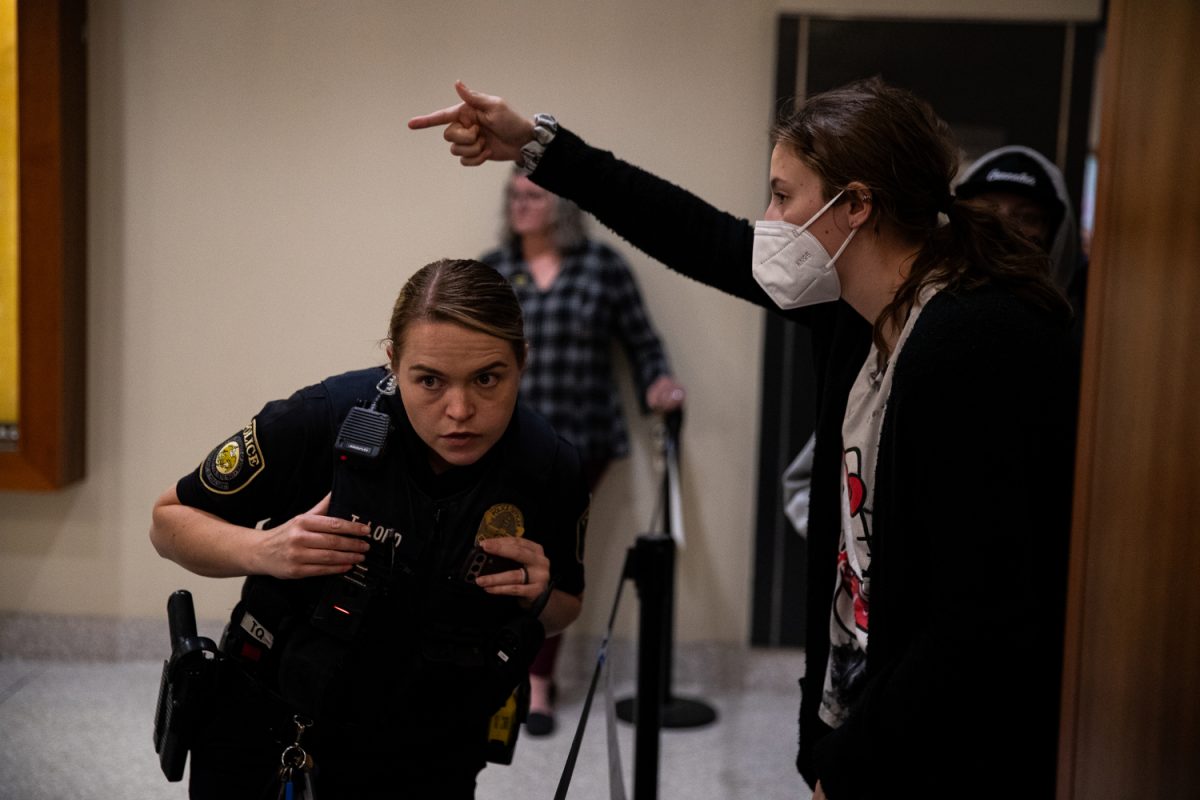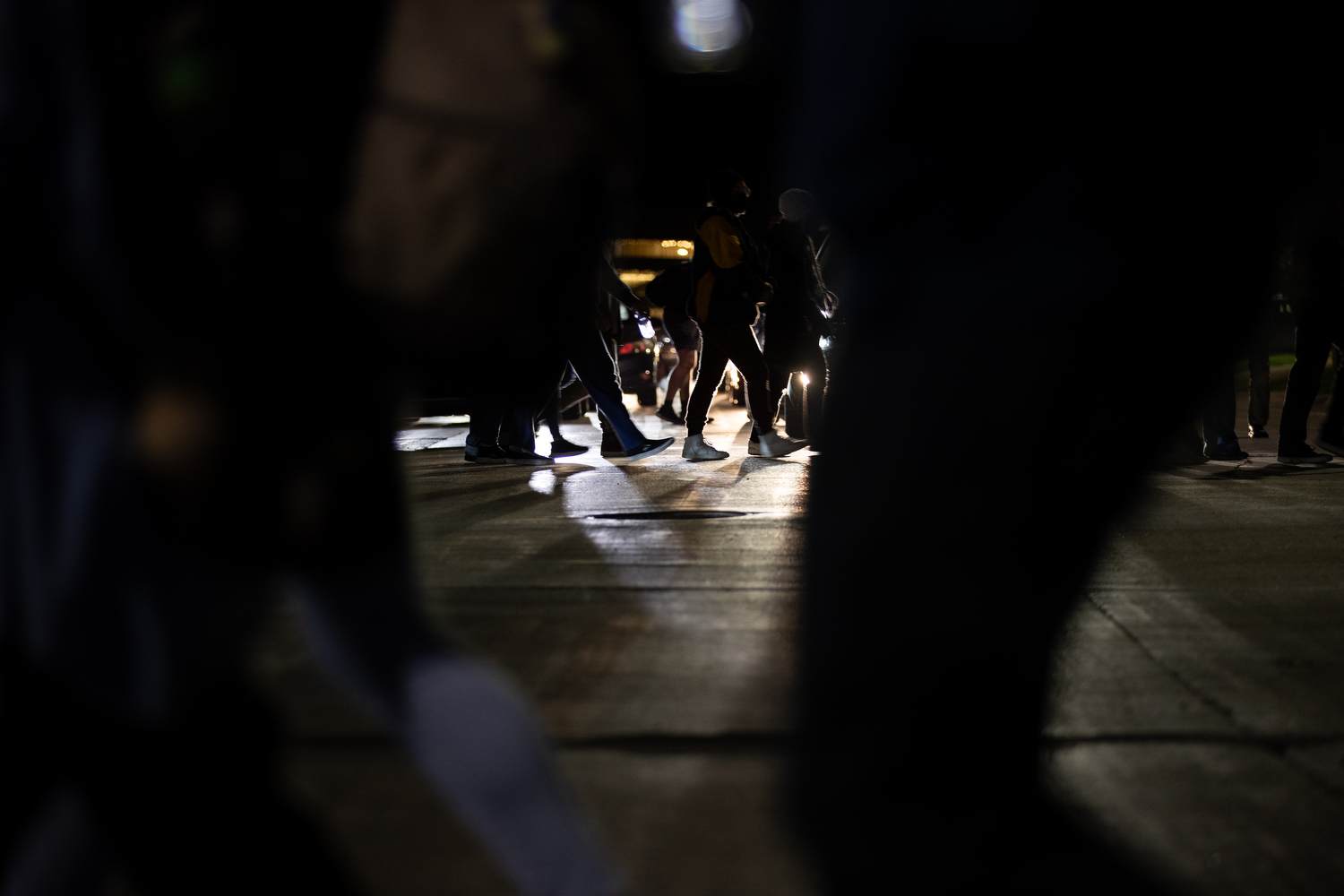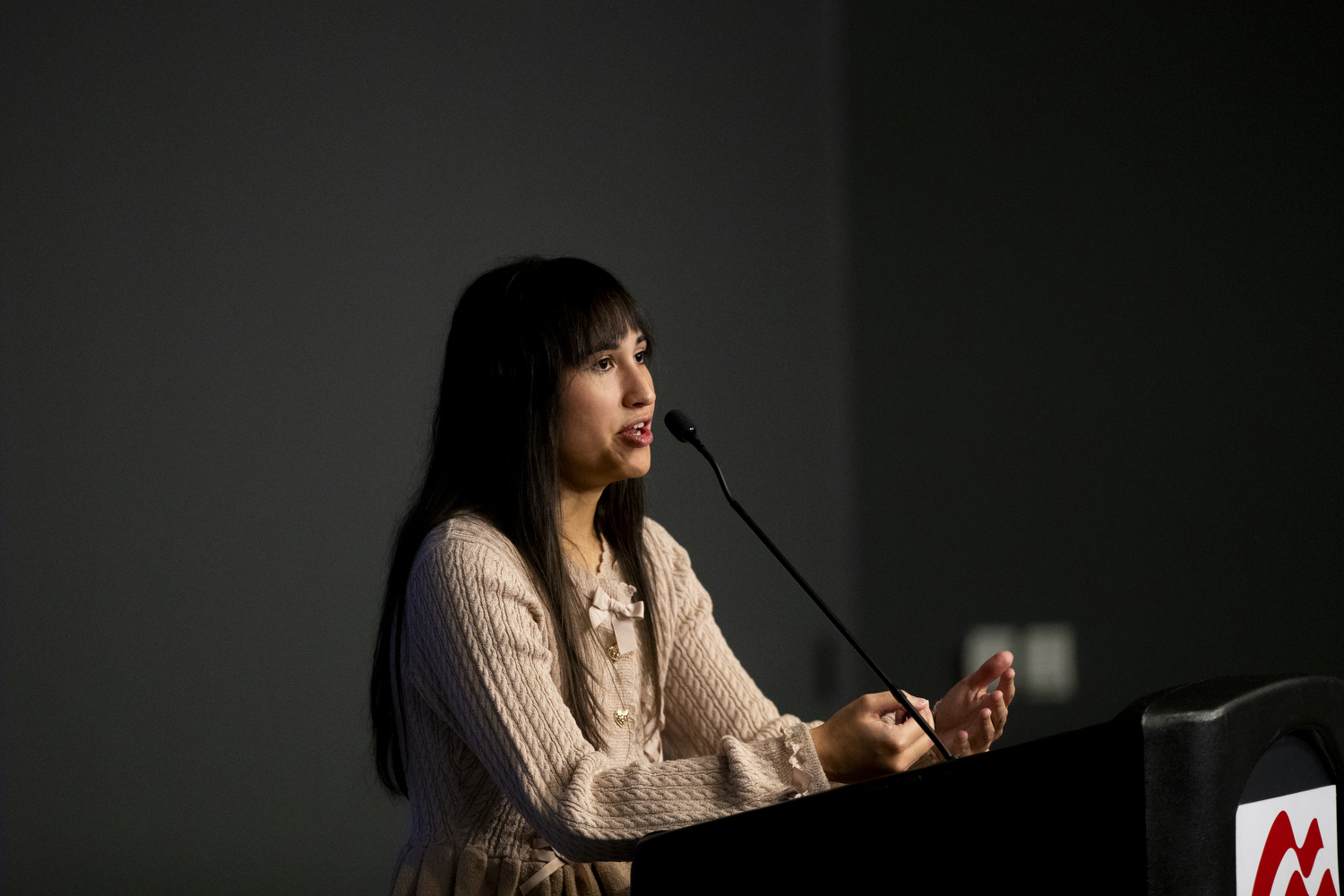Chants of “trans lives matter,” “trans rights are human rights,” and “f*** all fascists” rang out on Oct.16 as protesters walked circles in the crosswalks of the intersection of Madison and Jefferson Streets on the University of Iowa campus.
Blocking more than 20 cars from leaving, over 150 protesters stood outside the Iowa Memorial Union to protest Iowa Young Americans for Freedom’s latest UI campus speaker — Chloe Cole, a self-proclaimed “detransitioner.”
Cole’s appearance on campus Monday revived long-standing campus friction between First Amendment freedoms and university efforts to create an inclusive atmosphere. Cole, who is 19, detransitioned from a transgender man to female as a teen.
The UI Young Americans for Freedom chapter, a group of young conservatives, invited Cole to speak at the IMU’s Black Box Theatre. Cole spoke about her experience as a former transgender male, her medical transition, and her subsequent detransition. Cole has advocated for laws that ban gender-affirming care for minors, like Iowa’s own which was signed into law in March.
Iowa Young Americans for Freedom has brought a slew of contentious speakers to the UI, sparking controversy and protests since the group’s inception.
In April, the student group brought Daily Wire host and conservative commentator Matt Walsh to campus. His presence sparked a large protest outside the IMU, blocking traffic for almost an hour after the event.
Before Walsh’s appearance at the UI, controversial conservative figures, such as Donald Trump’s former campaign manager Kellyanne Conway, former Vice President Mike Pence, and retired Army Lt. Col. Allen West were invited to speak on campus by the Iowa Young Americans for Freedom.
Most of these events sparked an outcry from the UI community, with posters and advertisements promoting the lecture destroyed. Protests grew larger outside the events to counter the messages being shared by the speaker.
The UI has maintained that it must allow these speakers so as not to infringe upon student groups’ First Amendment rights.
As national politics becomes increasingly partisan, campus politics mirrors the divides playing out at universities around the U.S. as disagreement splinters student bodies on issues ranging from immigration policy to international conflicts.
Conservatives feel increasing partisan tensions have stifled their voices and discourse on campus, while some liberal students say certain conservative views don’t have a place on campus with inherently harmful views.
According to a September Associated Press and National Opinion Research Center Center for Public Affairs Research survey, 20 percent of the 1,095 adults that were surveyed think conservatives are able to freely speak their minds on college campuses, as opposed to the 47 percent who think liberals are able to speak freely.
However, a 2022 campus climate survey by the UI Office of Diversity found that 91 percent of undergraduates feel faculty encourages the expression of diverse viewpoints. There are 21,973 undergraduate students at the UI. Of the 4,679 responses to the survey, 16 percent were from undergraduates.
Jasmyn Jordan, the chairperson of the Iowa Young Americans for Freedom at the UI, said the student organization has seen an increase in vandalism, removal, and opposition to its advertisements around campus in the past two years.
Jordan, a UI third-year political science and international relations student, said several group members allegedly received death threats last year while organizing Walsh’s appearance.
Leading up to the lecture at the IMU on Oct. 16, Iowa Young Americans for Freedom’s chalk promoting the event on campus sidewalks was washed away and a motorist reportedly ran over a sign promoting the event that was placed on the T. Anne Cleary Walkway, Jordan said.
The identities of those who ran over the organization’s sign or washed away the chalk are not known at this time.
Estella Ruhrer-Johnson, president of University Democrats at Iowa, said campus politics has seemingly become divisive due to the nature of the topics debated on campus — specifically transgender rights.
Transgender rights were a hot-button issue in the 2023 Iowa legislative session, where Iowa Republicans passed three anti-LGBTQ+ bills including the ban on gender-affirming care.
Ruhrer-Johnson said Young Americans for Freedom’s speakers, namely Walsh and Cole, have brought discussions about transgender identities and LGBTQ+ rights to the forefront. She said advocating against a human’s existence and their right to peace has created what may seem like a divide on campus.
“I think that by bringing speakers that incite this kind of violence and incite this kind of hate shows how unappreciated their perspectives are on campus,” Ruhrer-Johnson said.

Free speech concerns
UI political science Professor Timothy Hagle said historically, freedom of speech movements have been associated with liberal causes, such as protests against the Vietnam War, which gained traction nationally starting in 1965.
Hagle said in recent years, freedom of speech has become an issue on college campuses and conservatives feel that university administration and liberal students are stifling their constitutional right to talk freely.
Out of 1,095 respondents to the Associated Press poll, 27 percent said universities do a somewhat or very good job at fostering a respectful, inclusive environment for conservatives. Meanwhile, 46 percent of respondents to the same poll said colleges foster inclusive environments for liberal students.
In recent years, the UI has been the subject of controversy involving freedom of speech and conservative students and student organizations. Recent controversies have stemmed from public health professors threatening disciplinary action for a student making comments considered homophobic in class to a College of Dentistry email chain criticizing a 2020 executive order issued by then-President Donald Trump.
After state lawmakers weighed in with concerns about protecting students’ free-speech rights following the UI College of Dentistry email chain, the state Board of Regents commissioned training for all students, faculty, and staff that attend or work at regent-controlled universities. The regents also commissioned a survey of freedom of speech on the three regent-governed campuses.
Despite free speech training, Jordan said she doesn’t feel the UI is doing enough to help Young Americans for Freedom prevent their signage and advertisements from being destroyed.
Jordan said after a meeting with UI President Barbara Wilson, her office allegedly recommended using digital signage to prevent its destruction.
Chris Brewer, a UI Spokesperson, said in an email to the DI counterprotests and actions must comply with state, local, and federal law in addition to the university’s code of Student Life.
“The university routinely works with student groups to ensure they are aware of and follow the policies and procedures related to counter demonstrations,” Brewer wrote.

Bridging the political divide
Although campus politics are divisive, campus political organization leaders said they are committed to working to bridge tensions and foster political discussion on campus.
Kyle Clare, member of the UI College Republicans, said the student organization is committed to talking with Democrats and keeping their minds open to discussion and debate.
“There’s important conversations that need to happen about our culture,” Clare said. “I want to bring the temperature down. I want to be able to have conversations about politics. I want to bring people together. I don’t want to keep people apart.”
Ruhrer-Johnson said they are committed to fostering safe spaces for political discussion on campus.
Though the student group supports political discussion and debate on campus, Ruhrer-Johnson said Cole’s message was inherently harmful to the LGBTQ+ community. Ruhrer-Johnson said messages like Cole’s make it difficult to engage politically when they affront students’ identities.
“I would love to have different political conversations. However, speaking with someone (whose) beliefs directly goes against another person’s existence, disagreements are going to happen,” Ruhrer-Johnson said. “When you start telling people what they can and can’t do, policing bodies, policing opinions, that’s when we get into some really dangerous, really scary territory.”



